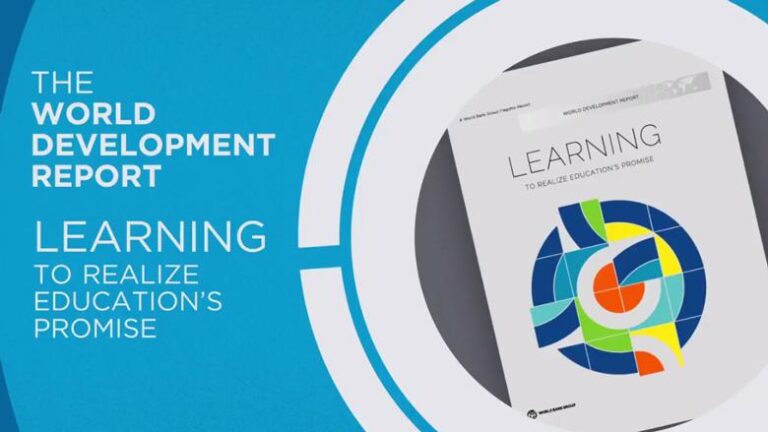Unlocking Education’s True Potential: Insights from the World Bank’s 2018 Development Report
Prioritizing Effective Learning Over Enrollment Numbers
The 2018 World Development Report by the World Bank marks a significant shift in global education discourse, emphasizing the necessity of meaningful learning rather than simply increasing school attendance. While expanding access to education remains a foundational goal, the report reveals a troubling reality: millions of children in developing nations attend school but do not acquire fundamental skills, such as literacy and numeracy, essential for their future success. This discrepancy highlights a hidden crisis where education systems fall short of delivering real value.
To address these shortcomings, the report recommends a comprehensive strategy that includes:
- Enhancing teacher effectiveness: Investing in rigorous training programs and ongoing professional growth.
- Updating curricula: Aligning educational content with local contexts and evolving job market requirements.
- Reforming assessments: Shifting from memorization-based tests to evaluations that measure critical thinking and applied skills.
- Fostering equity: Targeting support for disadvantaged and marginalized populations to bridge achievement disparities.
This integrated approach aims to transform enrollment into genuine learning achievements, empowering students and promoting social mobility.
| Nation | Enrollment Rate (%) | Basic Learning Proficiency (%) |
|---|---|---|
| Kenya | 85 | 45 |
| Bangladesh | 92 | 38 |
| Peru | 88 | 65 |
| India | 90 | 42 |
Confronting Learning Poverty: A Global Educational Imperative
Learning poverty—the inability of children by age 10 to read and comprehend a simple text—has become a formidable barrier to educational progress worldwide. The World Bank’s 2018 report reveals that over 50% of children in low- and middle-income countries suffer from this condition, severely limiting their future economic and social prospects. This issue extends beyond mere school attendance, reflecting deep-rooted challenges in the quality and relevance of education delivered.
To effectively reduce learning poverty, the report highlights several critical interventions:
- Building foundational skills early: Emphasizing literacy and numeracy during the initial years of schooling to establish a strong learning base.
- Elevating teacher quality: Offering continuous training and support to equip educators with innovative and effective teaching techniques.
- Utilizing data for informed decisions: Employing learning assessments and real-time analytics to tailor educational policies and programs.
- Ensuring inclusivity: Prioritizing access and quality for marginalized groups, including girls and children from underserved communities.
| Region | Learning Poverty Rate (%) | Primary School Completion Rate (%) |
|---|---|---|
| Sub-Saharan Africa | 89 | 70 |
| South Asia | 53 | 83 |
| Latin America | 35 | 90 |
| OECD Countries | 7 | 98 |
Reimagining Education: Forward-Thinking Policy Solutions
Transforming education systems demands innovative, evidence-based policies that balance equitable access with measurable learning gains. Among the most promising approaches is the integration of technology to customize learning experiences. Digital platforms that adapt to individual student needs can enhance engagement and accelerate mastery of concepts. Simultaneously, empowering educators through ongoing professional development and incentive structures ensures teaching methods evolve alongside advances in educational research.
Policymakers are encouraged to implement a multifaceted framework encompassing:
- Accountability through data: Establishing comprehensive monitoring systems to evaluate student progress and institutional performance, enabling timely corrective actions.
- Community involvement: Mobilizing parents and local stakeholders to create supportive learning environments beyond the classroom.
- Contextualized curricula: Designing flexible educational content that reflects local realities while maintaining core competencies for global competitiveness.
| Policy Domain | Recommended Initiative | Anticipated Outcome |
|---|---|---|
| Teacher Development | Ongoing in-service training and mentorship programs | Enhanced instructional quality and student achievement |
| Technology Adoption | Implementation of adaptive learning technologies | Customized educational experiences |
| Assessment Innovation | Transition to competency-based evaluation systems | More accurate measurement of student learning |
Leveraging Digital Tools and Analytics to Elevate Learning
In today’s digitally connected world, harnessing technology and data analytics in education presents unparalleled opportunities to enhance learning outcomes. Artificial intelligence-driven adaptive learning platforms enable personalized instruction tailored to each student’s strengths and weaknesses, moving away from uniform teaching models. These systems provide immediate feedback, allowing educators to identify and support struggling learners promptly, while empowering students to monitor their own progress.
Notable technological advancements improving education include:
- Interactive dashboards that flag students at risk and suggest targeted interventions
- Mobile education apps expanding reach to remote and underserved populations
- Augmented and virtual reality experiences that create immersive, hands-on learning environments
- AI-based tutoring systems offering personalized practice and explanations
| Technology | Primary Advantage | Illustrative Application |
|---|---|---|
| Adaptive Learning Platforms | Tailored instruction | Dynamic quizzes adjusting to student performance |
| Data Analytics Dashboards | Proactive support | Early identification of learners needing assistance |
| Mobile Learning Applications | Accessibility and convenience | Smartphone-based education in rural communities |
| Virtual Reality (VR) | Engaging experiential learning | Simulated environments for science and history lessons |
Final Thoughts: Charting a Path Toward Educational Excellence
The World Bank’s 2018 World Development Report powerfully underscores the urgent need to elevate education quality worldwide. Moving beyond the traditional focus on enrollment, it advocates for a comprehensive transformation that ensures students acquire the skills necessary to thrive in a rapidly changing global economy. By embracing innovative teaching practices, data-driven accountability, and technology-enhanced learning, governments and stakeholders can unlock education’s full potential, fostering inclusive growth and sustainable development for generations to come.







